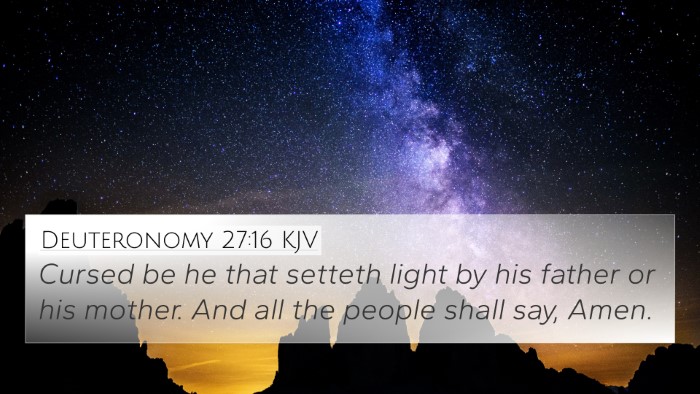Understanding Matthew 15:4
Matthew 15:4 (KJV): "For God commanded, saying, Honor thy father and mother: and, He that curseth father or mother, let him die the death."
Overview of the Verse
This verse emphasizes the importance of honoring one's parents as commanded by God. It includes both a positive command to honor and a severe consequence for disrespect, highlighting the seriousness with which God regards familial relationships and respect.
Commentary Insights
-
Matthew Henry:
Henry notes that the command to honor parents is rooted in the moral law and reflects the paramount importance of family structure in society. He emphasizes obedience and respect towards one’s parents as fundamental to spiritual health and social order.
-
Albert Barnes:
Barnes interprets this verse as a divine mandate that underscores the authority of parents as God’s representatives. He explores the gravity of cursing one’s parents, indicating that such actions represent a rebellion against God’s order.
-
Adam Clarke:
Clarke discusses the cultural context, elaborating on the severe penalties prescribed in the Mosaic law for disobedience to parents. He highlights how this command reflects the need for societal respect and the protection of the family unit.
Bible Cross-References
Here are some significant Bible verses that establish connections with Matthew 15:4:
- Exodus 20:12: "Honor thy father and thy mother: that thy days may be long upon the land which the LORD thy God giveth thee."
- Leviticus 20:9: "For every one that curseth his father or his mother shall surely be put to death."
- Deuteronomy 21:18-21: Discusses the consequences for a rebellious son, maintaining the theme of parental honor.
- Ephesians 6:1-3: "Children, obey your parents in the Lord: for this is right. Honor thy father and mother; which is the first commandment with promise."
- Colossians 3:20: "Children, obey your parents in all things: for this is well pleasing unto the Lord."
- Mark 7:10: Jesus quotes this command, emphasizing its ongoing importance and authority.
- CProverbs 1:8: "My son, hear the instruction of thy father, and forsake not the law of thy mother."
- Matthew 19:19: "Honor thy father and thy mother: and, Thou shalt love thy neighbour as thyself."
- 1 Timothy 5:4: Encourages caring for one’s family, specifically mentioning the role of widows and family obligations.
- Romans 1:30: Discusses societal breakdown, including the curse of disobedience to parents as part of moral decay.
Importance of Cross-Referencing Bible Verses
Cross-referencing Bible verses is a vital tool for deeper understanding and interpretation of Scripture. It allows believers to:
- Identify connections between Bible verses, reinforcing theological concepts.
- Create a comprehensive Bible verse analysis that connects various texts and themes.
- Utilize tools for Bible cross-referencing to enrich personal study and sermon preparation.
- Engage in thematic Bible verse connections that allow for a holistic view of Biblical teachings.
Methods for Effective Bible Cross-Referencing
Utilizing a Bible concordance or structured Bible cross-reference guide can enhance one's study experience. Here are some tips:
- Familiarize with a Bible Concordance: This tool can help in locating specific themes, phrases, or words across different Scriptures.
- Identify Links: Explore the relationships between the Old and New Testament perspectives on commands, where verses interpret or expand upon one another.
- Engage in Comparative Studies: Analyze Pauline epistles alongside Gospel texts to understand theological developments.
- Utilize Reference Materials: Make use of comprehensive Bible cross-reference materials that catalog verses according to themes and teachings.
Conclusion
Matthew 15:4 presents a crucial command from God regarding the honor of parents, a directive that holds substantial weight in Jewish law and Christian teaching alike. By integrating insights from various biblical commentaries and comparing related verses, believers gain a richer understanding of this divine directive. Cross-referencing not only enhances the individual’s study but also fosters a greater appreciation for the interconnected nature of Scripture.


















